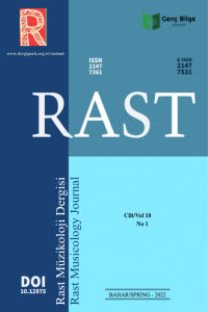From silence into song: Affective horizons and nostalgic dwelling among Syrian musicians in Istanbul
What roles might music play in how Syrian migrants in Turkey navigate new socio-economic, political, moral and affective terrains? How might music serve as a source of comfort and nostalgic remembrance in conditions of displacement, or even as a touchstone for contestation over collective memory and the meanings of belonging? This article explores the contradictions of lived experience among Syrian migrant musicians in Istanbul. Based on ethnographic research Istanbul since 2015, this article analyzes the growing Syrian musical culture in Istanbul, focusing on shifts in the relationship of Syrians to their urban environment, changes in their understanding of future horizons (afaq), and how this produces new forms of affective engagement both with their homeland and with their new home. Focus on a single artist reveals the contours of more significant shifts occurring among Syrians in Turkey more generally.
___
- Aksoy, Ozan. 2014. The Music and Multiple Identities of Kurdish Alevis from Turkey in Germany. PhD Dissertation, Department of Music, City University of New York Graduate Center.
- Baily, John. 1999. “Music and refugee lives: Afghans in Eastern Iran and California.” Forced Migration Review 6:10-13.
- Baily, John, and Michael Collyer. 2006. “Introduction: Music and Migration.” Journal of Ethnic and Migration Studies 32(2):167-182.
- Bithell, Caroline. 2006. “The Past in Music: Introduction.” Ethnomusicology Forum 15(1): 3-16.
- Boym, Svetlana. 2001. The Future of Nostalgia. New York: Basic Books.
- Gill, Denise. 2017. Melancholic Modalities: Affect, Islam, and Turkish Classical Musicians. Oxford: Oxford University Press.
- Gray, L. Ellen. 2013.Fado Resounding: Affective Politics and Urban Life. Durham, NC: Duke University Press.
- Hartog, François. 2015. Regimes of Historicity: Presentism and Experiences of Time. New York: Columbia University Press. Hill, Juniper, and Caroline Bithell. 2014. “An Introduction to Music Revival as Concept, Cultural Process, and Medium of Change.” The Oxford Handbook of Music Revival 29.
- Jablawi, al-, Hossam. 2018. Naturalized Syrians a Flashpoint in Turkish Politics.”
- MENASource, The Atlantic Council, 25 June 2018.https://www.atlanticcouncil.org/blogs/menasource/naturalized-syrians-a-flashpoint-for-turkish-parties. Accessed 19 March 2019.
- Kapchan, Deborah. 2008. “The Promise of Sonic Translation: Performing the Festive Sacred in Morocco.” American Anthropologist 110:467-483.
- Lagerkvist, Amanda. 2013. Media and Memory in New Shanghai: Western Performances of Futures Past. Basingstoke: Palgrave Macmillan.
- Malkki, Liisa. 1995. Purity and Exile: Violence, Memory, and National Cosmology Among Hutu Refugees in Tanzania. Chicago: University of Chicago Press.
- Pamuk, Orhan (2005), Istanbul: Memories and the City, London: Faber and Faber.
- Peteet, Julia. 2005. Landscape of Hope and Despair: Palestinian Refugee Camps. Philadelphia, PA: University of Pennsylvania Press.
- Pettan, Svanibor, and Jeff Todd Titon, eds. 2015. The Oxford handbook of applied ethnomusicology. Oxford Handbooks.
- Reyes, Adelaida. 2010. “Asymmetrical Relations: Conflict and Music as Human Response.” In Music and Conflict. O’Connell, John Morgan and Salwa El-Shawan Castelo-Branco, eds. pp. 126-140. Urbana, IL: University of Illinois Press. Shannon, Jonathan H.
- — — —. 2006. Among the Jasmine Trees: Music and Modernity in Contemporary Syria. Middletown, CT: Wesleyan University Press.
- Shelemay, Kay Kaufman. 2006. “Music, Memory and History.” Ethnomusicology Forum 15 (1): 17–37.
- — — —. 2011. “Musical Communities: Rethinking the Collective in Music.” Journal of the American Musicological Society 64 (2): 349–90.
- Stewart, Kathleen. 2007. Ordinary Affects.Durham, NC: Duke University Press.
- Stokes, Martin. 2010. The Republic of Love. Chicago: University of Chicago Press.
- ISSN: 2147-7361
- Yayın Aralığı: Yılda 4 Sayı
- Başlangıç: 2013
- Yayıncı: Genç Bilge Yayıncılık (Young Wise)
